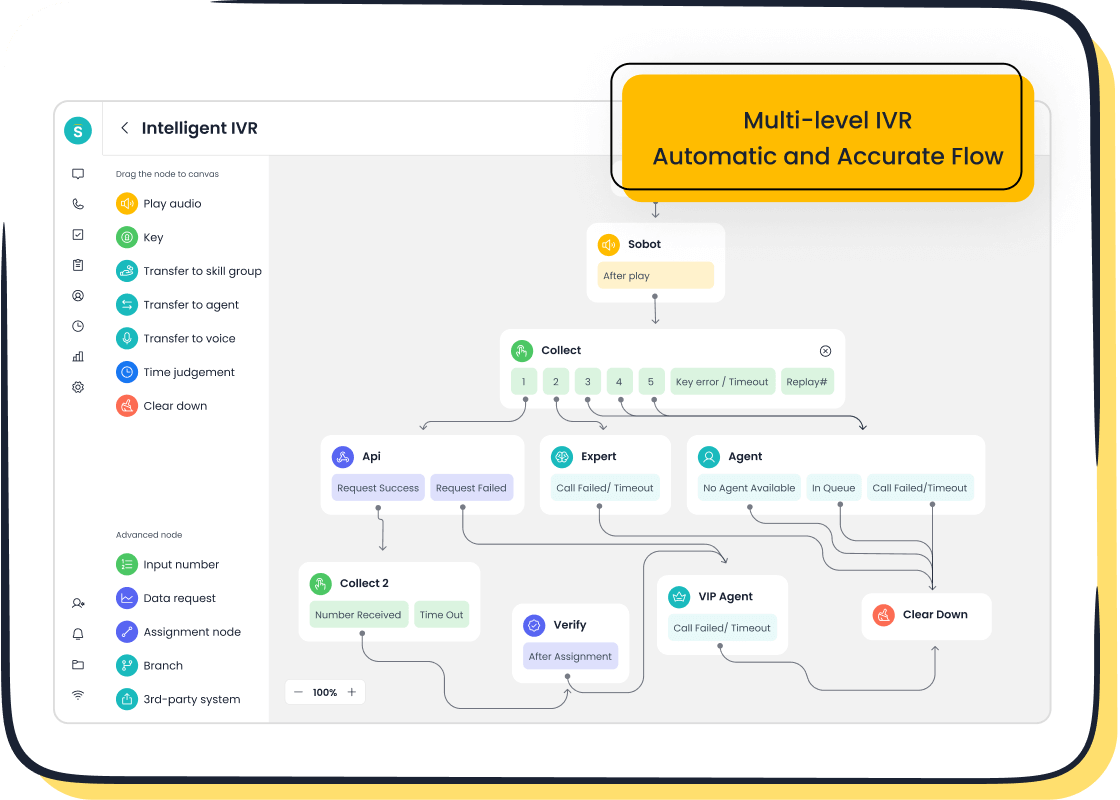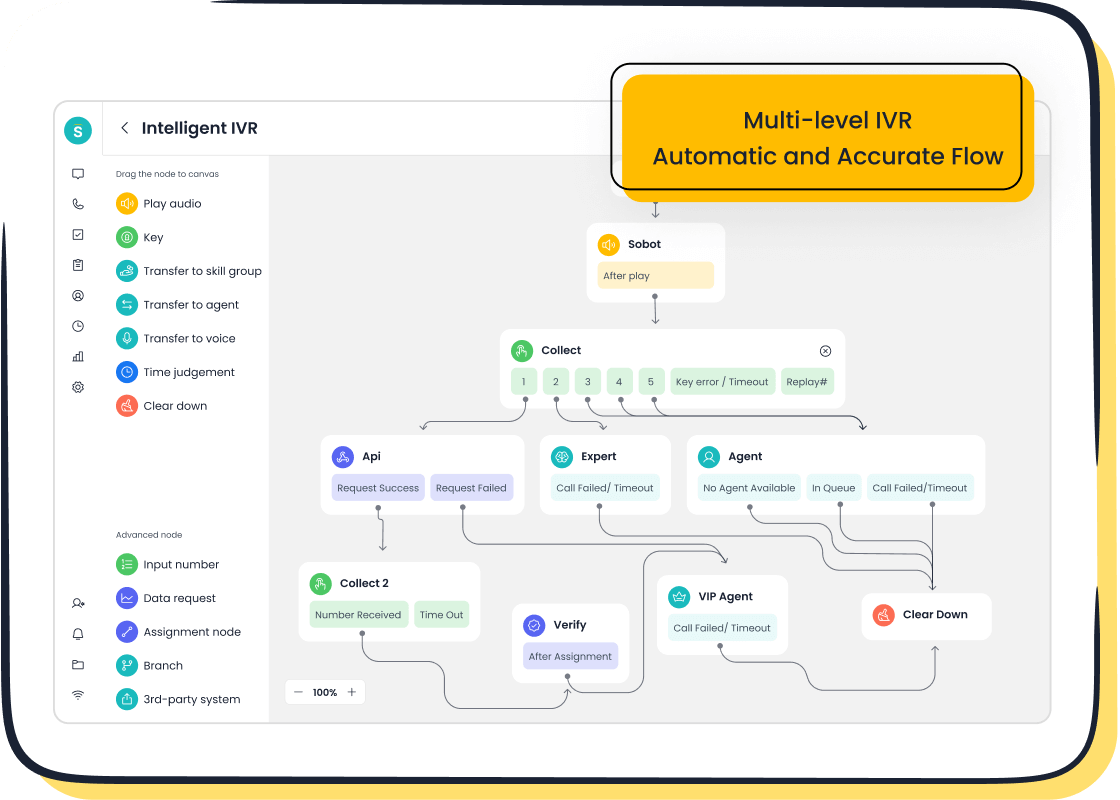Top Challenges in Omnichannel Customer Care and Solutions

Meeting customer expectations has never been more complex. Modern consumers demand seamless interactions across multiple channels, from social media to voice calls. Almost 79% of customers expect a unified experience across departments, yet only 16% of businesses have fully implemented an omnichannel model. This gap creates friction in customer journeys, where non-linear touchpoints across devices and platforms complicate engagement. Businesses that embrace omnichannel customer care see remarkable results, including a 250% increase in purchase rates and 90% higher customer retention. Sobot, a leader in omnichannel customer service, empowers brands to overcome these challenges with integrated solutions that unify communication channels and improve satisfaction.
Addressing Data Silos in Omnichannel Customer Care
The Impact of Fragmented Customer Information
Data silos create significant challenges in omnichannel customer care. When customer information is scattered across different platforms, you risk delivering inconsistent experiences. For example, a customer might receive irrelevant marketing emails because their preferences from social media interactions were not integrated into your system. This fragmentation can harm your brand reputation and lead to missed opportunities.
- Two-thirds of retail executives report a lack of customer analytics across separate channels.
- Nearly half (48%) attribute operational inefficiencies to silos of information within their organizations.
- Forty-five percent cite poor data quality as a major issue.
These challenges highlight the importance of integrating online and offline channels to ensure seamless customer experiences. Without a unified approach, your ability to deliver personalized and efficient customer service diminishes.
Unified Customer Profiles for Better Insights
Unified customer profiles are the cornerstone of an effective omnichannel strategy. By consolidating data from various channels, you gain a complete view of customer interactions. This approach allows you to tailor your engagement strategies and improve customer satisfaction.
| Benefit | Percentage Change |
|---|---|
| Reduction in CPM | 63.96% |
| Decrease in cost per order | 43.76% |
These numbers demonstrate the tangible benefits of unified profiles. When you integrate data management and analysis into your omnichannel retailing efforts, you reduce costs and enhance operational efficiency. Unified profiles also empower your team to deliver consistent omnichannel support, ensuring customers feel valued across all touchpoints.
Solutions: Leveraging Sobot's Omnichannel Platform
Sobot's Omnichannel Platform addresses data silos by integrating communication channels into a single system. This solution eliminates the need for separate channel management, enabling you to focus on delivering exceptional customer experiences.
| Feature | Description |
|---|---|
| Integration of Communication Channels | Eliminates separate channel management that creates data silos. |
| Automatic Customer Segmentation | Allows for tailored engagement through bespoke campaigns via WhatsApp, SMS, and calls. |
| Real-Time Data Analysis | Enhances customer insights and engagement by providing immediate data feedback. |
With Sobot's platform, you can unify customer profiles and leverage real-time data analysis to improve engagement. For example, automatic customer segmentation enables you to send personalized messages through WhatsApp, boosting interaction rates. By integrating online and offline channels, Sobot helps you overcome challenges in omnichannel retail and deliver consistent customer experiences.
Ensuring Consistent Customer Experience Across Channels

Why Consistency is Key in Omnichannel Support
Consistency plays a vital role in building trust and loyalty among your customers. When interactions across channels feel seamless, customers perceive your brand as reliable and professional. Research shows that 90% of customers expect consistent interactions across all channels. However, even a single negative experience can drive 52% of customers to switch to a competitor. Every touchpoint matters, and inconsistency can lead to lost revenue and diminished loyalty.
For example, imagine a customer starts a conversation on live chat but needs to switch to a phone call for further assistance. If the agent on the call lacks access to the chat history, the customer may feel frustrated repeating their issue. This disconnect can harm your brand's reputation. On the other hand, companies with strong multi-channel strategies retain an average of 89% of their customers, compared to just 33% for those with weak strategies.
By ensuring consistency, you not only meet customer expectations but also create a foundation for long-term loyalty.
Identifying and Bridging Channel Gaps
Channel gaps occur when your communication platforms fail to integrate effectively. These gaps often result in fragmented customer experiences, where information shared on one channel does not carry over to another. Identifying these gaps is the first step toward delivering seamless omnichannel support.
Start by analyzing your current customer service processes. Are there delays in transferring information between channels? Do customers frequently complain about repeating themselves? These are clear indicators of channel gaps. For instance, a quick-service restaurant improved its customer experience scores by 4 percentage points after addressing inconsistencies among underperforming locations.
To bridge these gaps, focus on integrating your communication channels into a unified system. This approach ensures that customer data flows smoothly across platforms, enabling agents to provide informed and efficient support. Unified systems also allow you to monitor performance metrics, helping you identify areas for improvement.

Solutions: Sobot's Voice/Call Center for Seamless Integration
Sobot's Voice/Call Center offers a powerful solution to ensure consistent customer experiences across channels. This platform integrates voice communication with other channels, creating a unified workspace for your agents. With features like intelligent IVR and smart call routing, Sobot enables your team to handle customer inquiries efficiently.
| Feature | Benefit |
|---|---|
| Intelligent IVR | Routes calls to the right agent or department, reducing wait times. |
| Unified Workspace | Provides agents with access to customer data from all channels. |
| AI-Powered Voicebot | Handles repetitive queries, freeing agents for complex issues. |
| Global Number Availability | Ensures seamless communication across different regions. |
For example, Sobot's unified workspace allows agents to view a customer's interaction history, whether it occurred via email, chat, or phone. This eliminates the need for customers to repeat themselves, enhancing their overall experience. Additionally, the platform's real-time monitoring and analytics help you identify and address channel gaps proactively.
By leveraging Sobot's Voice/Call Center, you can deliver consistent omnichannel support, improve customer satisfaction, and build lasting loyalty.
Overcoming Technology Integration Challenges
The Struggles of Legacy Systems in Omnichannel Retailing
Legacy systems often hinder the efficiency of omnichannel retailing. These outdated technologies create barriers to seamless integration, leading to inefficiencies and missed opportunities. For instance, maintaining legacy systems incurs high costs due to sporadic updates and outdated hardware. Integration with modern solutions often requires extensive custom coding, which is both time-consuming and expensive.
| Challenge | Description |
|---|---|
| Maintenance Costs | The cost of maintaining legacy systems is significant, with sporadic updates and outdated hardware creating bottlenecks. |
| Integration Difficulties | Integrating legacy systems with modern solutions often requires extensive custom coding, which is time-consuming and expensive, leading to data silos. |
| Cybersecurity Risks | Outdated systems are vulnerable to cyberattacks, with the average cost of a cyberattack reaching $9.48 million in 2023, highlighting the need for updated security measures. |
| Missed Opportunities | Legacy systems hinder modernization and competitiveness, as they are inflexible and do not support the evolving digital transformation strategies necessary for success in today's market. |
These challenges disrupt omnichannel customer care by creating inefficiencies and limiting the ability to deliver seamless customer experiences. For example, delays in data transfer between systems can frustrate customers and drive them to competitors.
Scalable Solutions for Modern Businesses
Modern businesses need scalable solutions to overcome the limitations of legacy systems. Cloud-based tools and AI-driven platforms offer flexibility and efficiency, enabling businesses to adapt to changing customer needs. The global retail automation market, valued at $12.2 billion in 2021, is projected to reach $33 billion by 2030. This growth highlights the increasing adoption of scalable technologies in omnichannel retail.
| Evidence Type | Description | Numerical Figure |
|---|---|---|
| Market Value | Global retail automation market value | $12.2 billion (2021) |
| Projected Growth | Estimated market value by 2030 | $33 billion |
| Customer Visits | Increase in customer visits due to automation | 11% increase |
Scalable solutions also improve customer experiences by streamlining operations and enhancing data management and analysis. For example, automation can reduce delays and ensure consistent service across channels, fostering customer loyalty.
Solutions: Cloud-Based Tools and Sobot's AI-Powered Voicebot
Sobot's cloud-based tools and AI-powered voicebot provide effective solutions for overcoming technology integration challenges. These tools enhance omnichannel customer care by streamlining communication and improving operational efficiency.
- Sobot's AI-powered voicebot has increased direct response rates by 35% for Renogy.
- Response accuracy improved by 27% after implementing Sobot's AI Agent.
- Knowledge base operation workload reduced by 90%, showcasing significant efficiency gains.
Sobot's AI Agent automatically answers customer inquiries using a centralized data management system. It learns from uploaded files and responds to questions not previously included in the knowledge base. This capability reduces the need for human agents, lowers operational costs, and ensures consistent customer experiences. By integrating these advanced tools, Sobot helps businesses modernize their operations and meet the demands of omnichannel retailing.
Real-Time Inventory Management for Omnichannel Retailing

The Role of Inventory Visibility in Customer Satisfaction
Inventory visibility plays a crucial role in shaping customer experiences in omnichannel retailing. When customers shop across multiple channels, they expect accurate stock information and timely order fulfillment. Real-time inventory management ensures you meet these expectations by providing up-to-date data on product availability.
| Key Statistic | Implication for Customer Satisfaction |
|---|---|
| Accurate inventory prediction | Enables precise planning and order placement, leading to timely fulfillment and enhanced satisfaction. |
| Meeting changing customer needs | Allows for customization of products based on customer preferences, improving overall experience. |
| Complete order fulfillment | Directly correlates with improved customer satisfaction and brand perception. |
For example, pairing slow-moving and fast-moving goods can increase order fulfillment rates while managing inventory effectively. This strategy not only reduces waste but also enhances your brand's reputation for reliability.
Challenges in Synchronizing Inventory Across Channels
Managing inventory across channels presents unique challenges. Many businesses struggle with data accuracy, visibility, and integration. Without real-time updates, you risk overselling products or showing them as out of stock, which frustrates customers and damages trust.
| Challenge | Description |
|---|---|
| Data Accuracy | Maintaining precise inventory records across all channels is difficult. |
| Visibility | Achieving full visibility over inventory requires advanced tools. |
| Integration | Adding new channels to existing systems often leads to inefficiencies. |
| Overselling and Underselling | Errors in stock counts can result in lost sales or overstocking. |
| Financial Losses | Poor synchronization can lead to financial losses and missed opportunities. |
For instance, delays in updating stock levels across platforms can cause customers to abandon their carts. Addressing these challenges is essential for delivering seamless customer experiences.
Solutions: AI and Automation for Real-Time Updates
AI and automation provide powerful solutions for overcoming inventory management challenges in omnichannel retailing. These technologies enable real-time tracking, demand forecasting, and inventory optimization.
| Capability | Description |
|---|---|
| Real-Time Inventory Tracking | Utilizes barcode scanning, RFID sensors, and IoT integration for immediate stock updates. |
| Demand Forecasting | Analyzes historical data to produce accurate demand forecasts, optimizing inventory levels. |
| Inventory Optimization | Provides recommendations for stock levels and replenishment based on demand analysis. |
| Inventory Analytics and Reporting | Tracks KPIs like inventory turnover and cycle count accuracy. |
For example, Sobot's AI-driven tools enhance inventory accuracy and reduce manual errors. By integrating automation into your operations, you can lower inventory costs, improve order fulfillment, and minimize out-of-stock situations. These solutions not only streamline your processes but also elevate customer satisfaction, ensuring your omnichannel retail strategy remains competitive.
Empowering Staff for Omnichannel Success
Training Challenges in Multichannel Environments
Your staff plays a pivotal role in delivering high-quality customer experiences, but multichannel environments often complicate training efforts. Agents must adapt to growing customer demands while navigating multiple platforms, each with unique workflows and tools. This complexity can lead to inconsistent service delivery and longer resolution times.
Research shows that 75% of consumers expect consistency across channels, yet 73% are likely to switch brands if they encounter inconsistent service. When your team lacks proper training, these expectations become harder to meet. For example, clients who experience seamless transitions from self-service to live representatives spend 27% less time in assisted channels, highlighting the importance of well-trained staff.
To overcome these challenges, focus on equipping your team with the skills and tools needed to manage integrated customer experiences. Real-time omnichannel reporting can empower agents by providing a comprehensive view of customer interactions, enabling them to deliver personalized service efficiently.
The Importance of Knowledge Management Systems
Knowledge management systems are essential for empowering your staff to meet growing customer demands. These systems centralize information, making it easier for agents to access accurate data quickly. Studies show that centralized repositories reduce information search time by 35%, leading to a 50% reduction in repeat queries.
Effective knowledge management also improves resolution times. Customer service representatives can reduce average resolution time by up to 40% when using structured knowledge bases. For instance, during the Ebola outbreak, the World Health Organization implemented a robust knowledge management system, reducing response times by 40%. This example underscores the critical role of organized information in urgent situations.
By implementing a well-structured system, you enable your team to provide consistent and efficient service across channels. This approach not only enhances customer satisfaction but also boosts operational efficiency.
Solutions: Continuous Training with Sobot's Unified Workspace
Sobot's Unified Workspace offers a comprehensive solution to empower your staff for omnichannel success. This platform integrates customer data from all channels into a single workspace, simplifying workflows and enhancing productivity.
- Real-Time Data Access: Agents can view complete interaction histories, ensuring contextual continuity and personalized service.
- AI-Powered Assistance: Automated tools handle repetitive tasks, freeing agents to focus on complex issues.
- Continuous Training Features: Built-in training modules help your team stay updated on new tools and processes.
For example, Sobot's Unified Workspace enables seamless transitions between channels, reducing customer frustration and improving satisfaction rates. By providing your staff with the right tools and training, you can deliver a seamless checkout experience and foster lasting loyalty.
Addressing challenges in omnichannel customer care is essential for delivering exceptional experiences. By overcoming obstacles like data silos, inconsistent service, and outdated systems, you can build stronger customer relationships and drive business growth. Advanced strategies, such as leveraging Sobot's solutions, empower you to adapt quickly and meet evolving customer expectations.
| KPI | Description |
|---|---|
| Customer Acquisition Cost (CAC) | Measures the cost of acquiring a new customer across all channels. |
| Customer Lifetime Value (CLV) | Indicates the total revenue generated by an average customer over their relationship with the brand. |
| Conversion Rates by Channel | Identifies which platforms are most effective in driving engagement and sales. |
| Retention & Churn Rates | Assesses whether customers are returning or disengaging after their first interaction. |
To succeed, you should:
- Track customer journeys across platforms to identify effective touchpoints.
- Use real-time data and AI-driven insights for personalized content.
- Analyze engagement metrics to refine messaging.
Sobot's omnichannel solutions help you turn these challenges into opportunities for innovation. By embracing adaptability and customer-centric strategies, you can enhance satisfaction, reduce costs, and achieve long-term success.
FAQ
1. What is omnichannel customer care?
Omnichannel customer care ensures seamless communication across multiple platforms like email, social media, and voice calls. It integrates customer data into a unified system, enabling consistent and personalized experiences. Sobot’s solutions simplify this process with tools like AI-powered chatbots and unified workspaces.
2. How does Sobot improve customer satisfaction?
Sobot enhances customer satisfaction by integrating communication channels, automating repetitive tasks, and providing real-time data insights. For example, Opay increased its customer satisfaction rate from 60% to 90% using Sobot’s omnichannel platform.
3. Why is AI important in omnichannel customer care?
AI improves efficiency by automating responses and analyzing customer data. Sobot’s AI-powered voicebot boosts response accuracy by 27%, reducing agent workload and ensuring faster resolutions. This technology helps businesses deliver consistent and high-quality service.
4. Can Sobot’s solutions handle global communication needs?
Yes! Sobot’s Voice/Call Center supports global telephony contacts and offers features like time zone support and multilingual AI tools. Businesses can provide seamless service to customers worldwide without compromising quality.
5. How does Sobot’s unified workspace benefit agents?
Sobot’s unified workspace consolidates customer data from all channels into one platform. Agents access complete interaction histories, reducing resolution times and improving service quality. This tool empowers your team to deliver efficient and personalized support.
See Also
A Complete Guide to Omnichannel Contact Center Implementation
Essential Insights on Omnichannel Call Center Software
Best Reviewed Contact Center Solutions for 2024
